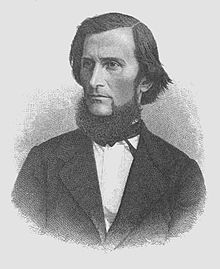Konstantin Dmitrijewitsch Uschinsky

|
|
| Cyrillic ( Ukrainian ) | |
|---|---|
| Костянтин Дмитрович Ушинський | |
| Transl. : | Kostjantyn Dmytrovyč Ušyns'kyj |
| Transcr. : | Kostjantyn Dmytrovytsch Uschynskyj |
| Cyrillic ( Russian ) | |
| Константин Дмитриевич Ушинский | |
| Transl .: | Konstantin Dmitrievič Ušinskij |
| Transcr .: | Konstantin Dmitrijewitsch Uschinsky |
Konstantin Dmitrijewitsch Uschinski (born February 19 July / March 2, 1824 reg. In Tula , Tula Governorate , Russian Empire ; † December 22, 1870 July / January 3, 1871 reg. In Odessa , Cherson Governorate , Russian Empire) a Russian- Ukrainian educator, writer and founder of scientific pedagogy in Russia.
Life
Konstantin Dmitrijewitsch Uschinski was born in Tula, Russia, and spent his childhood and youth on his father's small estate on the banks of the Desna near Novhorod-Siverskyj in what is now the Chernihiv Oblast in Ukraine . His father, a landed gentry, was a retired officer in the Russian Army and a veteran of the Patriotic War of 1812 , his mother came from the Ukrainian landed gentry and died when Konstantin Dmitrievich was 12 years old. He went to school in Novhorod-Siverskyj and passed his university entrance qualification there.
After graduating from high school, Uschinski studied until 1844 at the law faculty of Moscow University , where the lectures of the professor of philosophy and constitutional law Peter G. Redkin had a significant influence on him to turn to pedagogy. In 1844 he was awarded the degree of candidate of law . At the age of 22 he accepted an invitation as professor of jurisprudence at the Yaroslavl- Demidow Legal Lyceum. Since 1848 he also worked in Yaroslavl as an editor of the unofficial "Yaroslavl Province Gazette". In 1850 he had to leave school because of his democratic views. He then worked in Saint Petersburg as an official in the Ministry of Internal Affairs of the Russian Empire in the Department of Foreign Beliefs and Undeclared Work and wrote translations and reviews for newspapers. In 1851 he married his childhood friend Semenivna Doroshenko, who came from the noble Ukrainian family Doroshenko .
In January 1854, through the mediation of a former colleague from Demidov Lyceum, Uschinsky received a teaching position for Russian literature and geography at the Sirotsky Institute in Gatchina , and then from 1859 to 1862 he was inspector at the Smolny Institute for noble virgins in Saint Petersburg. In these educational institutions he was able to change old rules and traditions and introduce new, pedagogically more modern ones. Since 1860 he was the editor of the "Journal of the Ministry of Education", which he converted from a dreary trade journal into a lively, easily readable, educational newspaper. This led to resentment and political denunciation in conservative circles, so that Uschinski left Russia for Central Europe in 1862 to study educational work abroad. He traveled to France, Belgium, Italy, Germany and Switzerland, visited and studied different educational institutions everywhere, especially in Germany and Switzerland, because there he recognized innovations in education. Outside Russia, he also met Nikolai Pirogow . While still abroad, in 1864 he wrote the Russian textbook “Heimatliches Wort”, the first Russian textbook for the basic education of children, of which 157 editions were published.
In 1867 he returned to the Russian Empire and devoted himself to literary activity, so that further educational textbooks and guides for teachers and parents such as "Kinderwelt" followed. He also wrote many children's books with fairy tales and stories in which he skilfully integrated elements of Russian folklore.
His pedagogical approach aimed to raise children to lead an independent life and to develop in people the motivation to independently acquire new knowledge. Ushinsky was among the first to develop the foundations of pedagogical anthropology, and his textbooks had a major impact on Russian pedagogy. In the last years of his life, Konstantin Uschinski was an outstanding figure in public life. During this time he lived in Kiev, interrupted by stays at health resorts due to a chronic illness . He died in Odessa in early 1871 and was buried in Kiev at the Vydubyzkyj Monastery necropolis .
Honors
- A memorial was erected in his honor in Novhorod-Siverskyj.
- In Odessa, the South Ukrainian K.-D. Ushinsky University of Education in Odessa was named after him.
- The Ministry of Education and Science of the Russian Federation donated a medal in 1999 that bears his name and is awarded to people who have made significant achievements in the field of pedagogy, psychology or didactics.
Web links
- Biography Konstantin Dmitrijewitsch Uschinski on subject.com.ua (Ukrainian)
- Biography Konstantin Dmitrijewitsch Uschinski on koob.ru (Russian)
swell
- ↑ a b c Biography and works Konstantin Dmitrijewitsch Uschinski on hobbitaniya.ru; accessed on May 11, 2016 (Russian)
- ↑ a b biography Konstantin Dmitrijewitsch Uschinski on calend.ru; accessed on May 11, 2016 (Russian)
- ↑ a b c d e biography Konstantin Dmitrijewitsch Uschinski on hrono.ru; accessed on May 11, 2016 (Russian)
- ↑ a b Article on Konstantin Uschinski ( Memento from May 11, 2016 in the Internet Archive ) in Voice of Russia from May 28, 2009; accessed on May 11, 2016
- ^ Regulations on the medal KD Uschinski ; accessed on May 11, 2016 (Russian)
| personal data | |
|---|---|
| SURNAME | Uschinski, Konstantin Dmitrijewitsch |
| ALTERNATIVE NAMES | Ушинский, Константин Дмитриевич (Russian); Uschynskyj, Kostjantyn (transcribed in Ukrainian); Uschinskij, Konstantin |
| BRIEF DESCRIPTION | Russian-Ukrainian pedagogue, writer and founder of scientific pedagogy in Russia |
| DATE OF BIRTH | March 2, 1824 |
| PLACE OF BIRTH | Tula , Tula Governorate , Russian Empire |
| DATE OF DEATH | January 3, 1871 |
| Place of death | Odessa , Kherson Governorate , Russian Empire |

